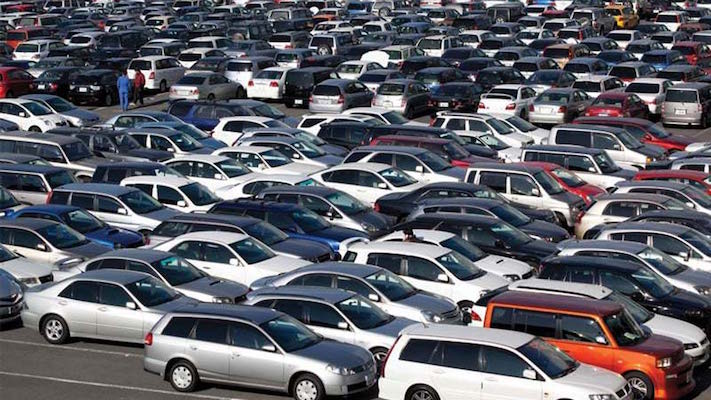Nigeria’s auto import sector has witnessed a dramatic surge, with the National Bureau of Statistics (NBS) reporting a 90 percent jump in vehicle imports, largely attributed to recent improvements in foreign exchange (FX) stability. The development marks one of the clearest signs yet that currency reforms and steady inflows are beginning to ease pressures on international trade, particularly in the automotive industry.
For years, importers of cars and spare parts in Nigeria have grappled with currency volatility, fluctuating exchange rates, and limited access to foreign exchange. This situation had driven up costs, suppressed demand, and forced many dealers to scale back operations. However, with the Central Bank of Nigeria (CBN) implementing tighter monetary policies, boosting reserves, and attracting more FX inflows, the naira has shown relative stability in recent months. The result has been renewed confidence among importers and a rebound in the auto trade.

Industry operators confirm that demand for both new and used cars has risen sharply. Importers are reporting increased orders, especially through Nigerian ports in Lagos, Tin Can Island, and Onne, where clearance activities have intensified. Vehicle dealers say the stabilization of the naira has provided clarity in pricing, making it easier for businesses to plan shipments and for customers to anticipate costs without fear of sudden price shocks.
Analysts point out that the 90 percent rise in auto imports is not just a reflection of FX stability but also the impact of improving consumer sentiment. With inflation easing slightly in recent months and government revenue measures improving fiscal space, more Nigerians appear willing to make big-ticket purchases. The auto market, which had been subdued by years of economic uncertainty, is now showing signs of recovery.
Nonetheless, experts warn that while the rebound is encouraging, it also raises concerns about Nigeria’s import dependency. Cars remain one of the country’s biggest non-oil imports, putting pressure on trade balances. The surge highlights the need for policies that balance consumer demand with support for local vehicle assembly plants. Nigeria has several auto-assembly initiatives, but production has struggled to take off due to infrastructural challenges, high operating costs, and competition from cheaper imported vehicles.
The Nigeria Customs Service has also noted the surge in imports, with officials projecting higher revenue from duties and levies on vehicles in the coming quarters. This increase in customs receipts will provide some fiscal relief to the federal government, which is battling to boost non-oil revenue amid tight fiscal conditions. However, the revenue growth also underscores Nigeria’s continued reliance on imports instead of domestic production.
Stakeholders in the auto industry are calling for a dual approach: maintaining FX stability to encourage fair trade while simultaneously investing in local manufacturing capacity. They argue that Nigeria cannot continue to rely heavily on vehicle imports, especially given the economic strain from rising fuel costs and the government’s push toward economic diversification.
Consumer behavior is also shifting in response to the new FX dynamics. Dealers report that while demand for luxury vehicles has improved, the bulk of imports are still used cars, popularly called “Tokunbo.” Middle-class Nigerians, who had been priced out of the market due to high exchange rates, are gradually returning as buyers. Some dealerships have also started offering flexible payment plans, citing increased predictability in import costs.
The broader economic picture suggests that FX reforms are beginning to yield results across multiple sectors. From manufacturing inputs to finished goods, businesses are reporting fewer disruptions in their import processes. In the case of automobiles, the effect is particularly visible because of the sector’s high sensitivity to exchange rate movements.
Government officials have welcomed the rebound but stress the importance of ensuring it translates into long-term economic benefits. The Ministry of Trade and Investment has reiterated its commitment to supporting local auto assemblers through tax incentives, duty waivers on CKD (completely knocked down) parts, and public-private partnerships. Officials argue that if FX stability can be maintained alongside supportive industrial policies, Nigeria could eventually become an auto hub in West Africa.
However, industry critics caution that without consistent policy implementation, Nigeria risks missing out on opportunities to build its auto industry. They note that past attempts at reviving local assembly have been undermined by policy reversals, high tariffs, and weak infrastructure. The present spike in imports, while positive for traders, could once again overshadow efforts to strengthen domestic capacity.
Looking ahead, the auto import surge could serve as a barometer for the success of Nigeria’s broader economic reforms. If stability in the FX market persists, more sectors may record similar rebounds, attracting investment and boosting trade activity. For now, the auto industry’s 90 percent jump offers a clear sign of recovery, giving both businesses and consumers renewed hope after years of economic strain.
At the same time, the challenge remains how to sustain this momentum while addressing the structural issues that have long plagued Nigeria’s manufacturing sector. For policymakers, the task is ensuring that FX stability translates not only into more imports but also into opportunities for local production, job creation, and long-term industrial growth.
The latest figures show that Nigeria’s road to economic recovery is still tied closely to the health of its foreign exchange market. As long as FX stability holds, industries like automotive imports will continue to thrive, but whether that translates into deeper, sustainable growth remains the bigger question.
Support InfoStride News' Credible Journalism: Only credible journalism can guarantee a fair, accountable and transparent society, including democracy and government. It involves a lot of efforts and money. We need your support. Click here to Donate
